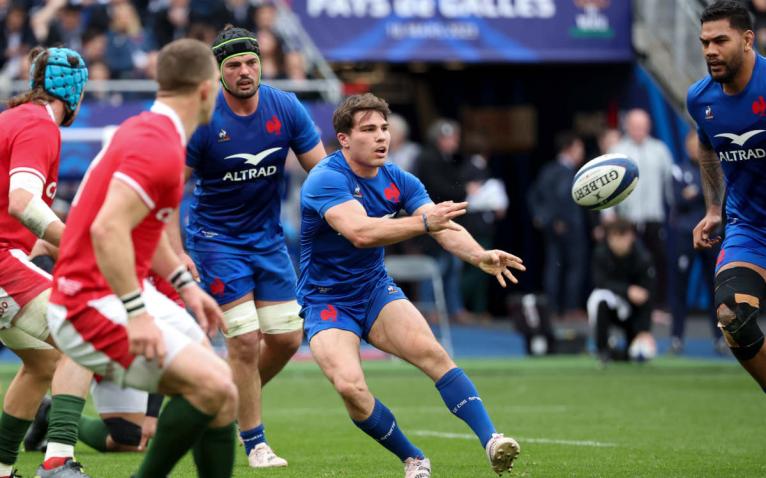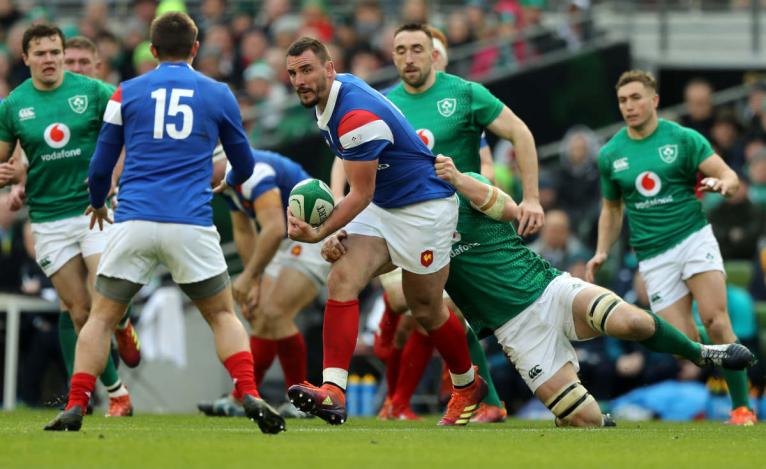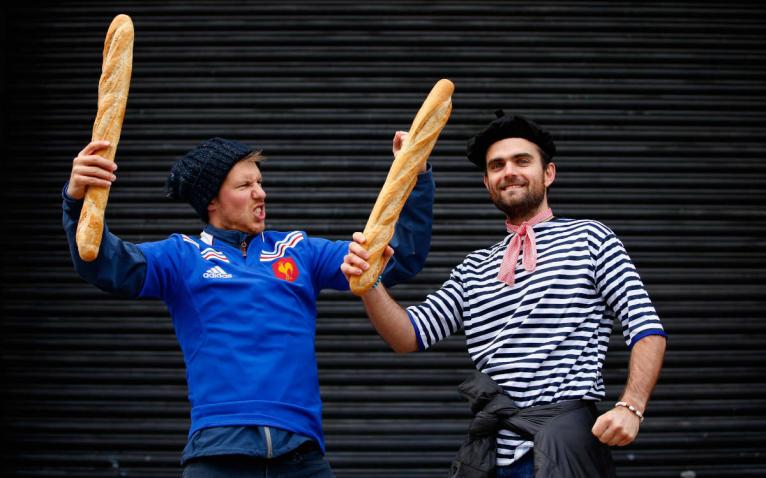You know the Rugby World Cup is coming to France when a Gastronomy XV is announced. Composed of fifteen of the country’s top chefs, including a couple from the Elysée Palace, the team assembled at a Paris railway station in 2020 when the RWC organisers launched their tournament train. One of the XV, Christian Etchebest, declared in a tweet: “Gastronomy, rugby, cooking, friendship.”
It could be the motto of the French Rugby Federation for in the Republic the sport is inextricably linked with its Gastronomy. In his 1993 book, Thugs and Gentlemen, Jean Lacouture wrote: ‘Rugby isn’t just a set of rules…it’s a certain art de vivre, a certain arc and colour of the landscape, a certain taste for something a little too much, a taste…for thick garbure [stew], a taste for mushrooms, goose and pigeon confit’.
The advent of professionalism two years later did little to alter this philosophy. While their Anglophone rivals prepared for World Cups by training with the Royal Marines or going on a survival course in the African bush, France bonded – as was the case before the 2011 World Cup – by having a cooking competition organised by some of the country’s leading chefs. This was deemed the most effective way to “encourage group cohesion”.

During the preparation for the 2015 World Cup, the then France coach Philippe Saint-Andre hosted six of the country’s top chefs to the squad’s training base at Marcoussis. What was served to the players was studiously reported by an envious French press: lobster medallions, stuffed potatoes, green bean salad with foie gras and peaches. And that was just for starters. Next were two wild salmon – eight kilos each – accompanied by a salad of peas, feta cheese and mint. A brief respite and then came the foie gras soup with oysters, followed by a cassoulet and various barbecued meats. Dessert consisted of a buffet of delicacies including chocolate cakes and lemon meringue tarts. “We ate and laughed with them,” said one of the chefs, Yves Camdeborde. “It was like a picnic with friends. After midnight, there was nothing left to eat.”
The next time France were that stuffed was in the quarter-final, thrashed 62-15 by New Zealand. One imagines that the All Blacks didn’t train for the 2015 World Cup on foie gras and lemon meringue tarts.
The bond between French players and their food remains, and frequently the money players make from the sport is invested in restaurants
France are not so decadent under Fabien Galthie’s regime, which goes some to explaining why the Bleus are fitter than they’ve ever been. The days are gone when France would invariably wilt in the final quarter of matches as all those chocolate cakes caught up with them.
Nonetheless the bond between French players and their food remains, and frequently the money players make from the sport is invested in restaurants. Xavier Garbajosa, Clément Poitrenaud, David Attoub, Frédéric Michalak, William Servat, Fabien Pelous, Pascal Pape and Jean-Luc Sadourny are just some of the Bleus who have in some shape or form entered the restaurant trade.
Some of them fail spectacularly, such as Michalak’s ‘64’ restaurant, which was launched in 2010 but lasted just eighteen months. Another high-profile player who was unable to transfer his talent on the rugby field to the restaurant trade was Jean-Pierre Rives.

On the other hand, Patrick Soula, a member of the Toulouse squad in the 1990s, opened his first restaurant – ‘Tommy’s Diner’ – in 1993 and he now has a further ten with a total staff of 400.
Jean-Marie Cadieu, a former teammate of Soula’s, who won 12 caps for France in the second row, ran a restaurant for 20 years in Toulouse. “There are no secrets in the restaurant business,” he said. “To succeed, as in professional rugby, you have to learn the trade and then devote yourself 100% to it. Customers are fooled two or three times, rarely more, by the jokers who just put their name on a sign and are never there.”
There is a long tradition of farming in French rugby, from the Spanghero brothers to the great prop Jean-Pierre Garuet, hooker Daniel Dubroca, through to prop Jérôme Rey, a member of the current Lyon squad
But the link between food and rugby in France is more profound than the restaurant trade; its roots are in the soil itself. One of the official suppliers for this year’s World Cup is a union of French agricultural cooperatives. When the deal was announced, the then tournament organiser, Claude Atcher, declared: “That’s where rugby comes from: from these regions where tradition is dared, where every gesture is part of the respect for nature and the celebration of its excellence.”
There is a long tradition of farming in French rugby, from the Spanghero brothers to the great prop Jean-Pierre Garuet, hooker Daniel Dubroca, through to prop Jérôme Rey, a member of the current Lyon squad, who splits his time between the training ground and his dairy farm. “I come from the heart of France,” Garuet once said. “From the land.”

Louis Picamoles is the latest famous French name to launch his new life on the land, what Le Figaro described as “another illustration of the strong links that have united the worlds of rugby and agriculture for many years”. Picamoles, who won 82 caps for the Bleus in the back row, is learning how to become a producer of one of France’s specialities: goat’s cheese. A camera crew recently spent a couple of days with Picamoles and his wife on their isolated property where they live with their herd of goats. It is a long way from the glamorous life he led as an international sportsman but one that Picamoles is evidently enjoying: “I like the solidarity that you find in the farming community,” he said. “And it’s similar to the values we have in rugby.”
Antoine Dupont comes from Castelnau-Magnoac, a small village in the Pyrenees. His family has been here since 1850. In the last thirty years his uncle, father and elder brother, Clement, have become award winning breeders of the famous ‘Black Pig of Bigorre
Picamoles was a rarity among French rugby players in that he hailed from the north of the country; the sport’s heartlands are in the deep south. The blood is hotter down here, the villages and towns more tribal, and agriculture has traditionally been at the heart of communities more than in the industrialised north. It is a virile land and rugby appealed to the men who worked the soil.
Antoine Dupont comes from Castelnau-Magnoac, a small village in the Pyrenees. His family has been here since 1850, running a restaurant and farming. In the last thirty years his uncle, father and elder brother, Clement, have become award winning breeders of the famous ‘Black Pig of Bigorre’. “We spent our childhood between the family restaurant, fishing trips and hunting with our grandfather,” explained Clement in a recent interview with Midi Olympique. “When [Antoine] visits Castelnau-Magnoac, it’s to get away from everything, escape the day to day pressure. The countryside is ideal in that respect because it’s natural and unchanging.”

The last time France hosted the World Cup was in 2007 when, inexplicably, an average loose forward with long hair and a beard became the face of the tournament in France. The ‘Caveman’, as Sebastien Chabal was known, was a marketing creation who embarrassed rugby’s connoisseurs. There’s nothing embarrassing or phoney about Antoine Dupont, whose image adorns much of the pre-tournament publicity in France.
The Toulouse scrum-half is not just the face of the World Cup, he’s the soul of French rugby, the representation of its rural roots. He is a man of the earth, and, one suspects, a man with a taste for a good plate of pigeon confit.


Garuet was a potato farmer from Lourdes. A good friend of mine propped against him once. He shook his head at the scrums: "The closer we got to the ground, the stronger he became."